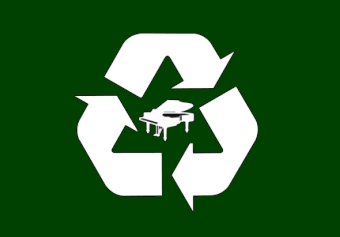Why "Recycle" Your Piano?
 There are many good reasons -- some simple, some more complex; some emotional, others purely economical -- as to why piano owners decide to use the Piano Recyclers Discount. Here are some of the reasons we see:
There are many good reasons -- some simple, some more complex; some emotional, others purely economical -- as to why piano owners decide to use the Piano Recyclers Discount. Here are some of the reasons we see:
It's Economical
We begin with a base price depending upon the size of the piano. This means, from the outset, you won't be paying for more work than you need. Besides the decided details of the work order, this price includes pickup and delivery. The value of starting with a base price rather than ordering a comprehensive package is that the funds are directed toward exactly what's needed to make your piano fun and desirable again. If your piano needs more intensive work than the base price can cover, we will offer more detailed recommendations. Be assured, in our assessment of your piano, we pledge to recommend exactly what we consider to be necessary work.
You Don't Pay Twice for More Extensive Work
If in the future, your piano comes to need a more comprehensive restoration, the amount of the base price can be applied to a more complicated plan. The goal is to repair your piano exactly to the extent that it needs the work. In this way, an overall plan is constructed by initially addressing what's most needed. This forms a new foundation for the piano's ongoing history of care.
Pianos Are Simply Beautiful
 With their stylish lines and contours, it's not just the sound of a well tuned piano that holds our attention. The cabinets, too, are often preserved as show pieces, even works of art.
With their stylish lines and contours, it's not just the sound of a well tuned piano that holds our attention. The cabinets, too, are often preserved as show pieces, even works of art.
The Quality of Materials are Built In
Classic pianos of the 19th and 20th century were often made with materials that are of superior quality than what is produced today. From old growth lumber for cabinets and sound boards, to the elaborate, highly skilled work of hands-on craftsmen, these qualities are ever more rare and well worth the effort of recycling.
Maintaining the Quality of One's Assets
In today's erratic economy, it makes good sense to keep and improve these good things we love and cherish, things of value that we already own, things that make us happy and connect us to the world and to each other.
Old Pianos are Often Heirlooms.
All pianos are historical. They all have stories to tell. Many old pianos have been passed down from generation to generation, from great grandparents to grandparents to parents, then to children and children's children's children. It's good to keep generational connections alive with something worthy of passing down.
Recycling your piano Helps the Environment
 Recent news stories tell of the coming tide of old pianos that need restoring. Piano owners, unaware of the options before them, misinterpret their piano's age and neglect as signs that the piano has become worthless, and so they throw them away. In terms of recyclable parts and restorable pianos, this trend is anything but necessary, and a terrible waste that could be avoided.
Recent news stories tell of the coming tide of old pianos that need restoring. Piano owners, unaware of the options before them, misinterpret their piano's age and neglect as signs that the piano has become worthless, and so they throw them away. In terms of recyclable parts and restorable pianos, this trend is anything but necessary, and a terrible waste that could be avoided.
Because the piano must maintain the support of an incredible amount of physical tension, many structural parts of the piano are built for high strength. As a result, these parts can last a long, long time. The internal metal frame is an example.
We Continue to Count the Reasons.
The recycler's approach toward piano restoration is analogous to maintaining a beloved, classic car; we plan our strategy as a series of well prepared, methodical steps. Rather than choose a radical overhaul -- an option many cannot afford -- our approach is to address those things that are needed first, needed immediately in order to make the piano enjoyable. For example, depending upon the type of piano and its intended use, if the cabinet is in need of refinishing much more than the piano is in need of new strings, we would recommend concentrating our efforts on refinishing the cabinet. Since the strings are still in good shape, why replace them? This method keeps budgeted funds focused upon the most pressing needs of the piano. The base price for this approach is typically a third of what a comprehensive restoration would cost.
Our clients love their pianos because of their sound, their beauty, their familiarity. They love their pianos not just for the wonderful music they can produce, but also for the deep abiding connections the piano often has to family and the warm interiors of a vibrant home.
It's true. We love our pianos. We love them because they're an American tradition, through and through. We love them, too, because our pianos are reflections of one of the greatest of artistic achievements. Truly, what would music be without the piano?
Tell us your reason. Why do you love your old piano? Why should you want to save it? Michael Sweeney has been recycling pianos for almost forty years. Let us help.